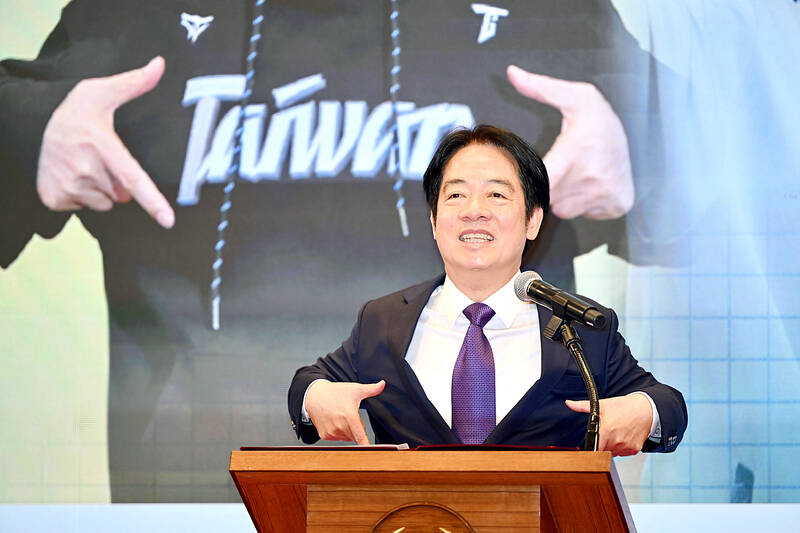President William Lai (賴清德) yesterday urged parties across the political divide to democratically resolve conflicts that have plagued domestic politics within Taiwan’s constitutional system.
In his first New Year’s Day address since becoming president on May 20 last year, Lai touched on several issues, including economic and security challenges, but a key emphasis was on the partisan wrangling that has characterized his first seven months in office.
Taiwan has transformed from authoritarianism into today’s democracy and that democracy is the future, Lai said.

Photo: Lo Pei-de, Taipei Times
“No matter what threats and challenges Taiwan faces, democracy is the only path for Taiwan,” he said. “The only choice is to keep moving forward without looking back.”
Although political party competition is part of the democratic system, “domestic political disputes should be resolved under a democratic approach within the country’s constitutional system,” he said.
However, Lai said that the government and the public have the right to oppose moves by the legislature.
The Constitution says that the Executive Yuan has the right to reject a law passed by the legislature by asking the lawmaking body to reconsider it, or, once the law takes effect, by taking it to the Constitutional Court for adjudication, he said.
People also have the right of “election, recall, initiative and referendum,” enabling them to exercise greater democratic power and show that the people are the source of political legitimacy, he said.
Lai’s comments came as his ruling Democratic Progressive Party (DPP) battles the Chinese Nationalist Party (KMT) and the Taiwan People’s Party (TPP) in the legislature, which together have a majority of seats.
TPP lawmakers have sided with the KMT on legislation that the DPP has opposed, including three bills passed last month that the Cabinet has said it would ask the legislature to reconsider.
The bills, which triggered scuffles in the legislature, cover new measures that tighten recall petition requirements, curb the Constitutional Court’s ability to rule on cases and change central government revenue allocations.
Premier Cho Jung-tai (卓榮泰) said that the Cabinet would take action to counter them, as the three packages are “difficult to implement.”
Later, during a news conference following his New Year’s address, Lai was asked by reporters whether he would invite opposition party leaders for a “reconciliation coffee.”
He said he plans to invite Legislative Speaker Han Kuo-yu (韓國瑜) of the KMT to the Presidential Office for a meeting before Han departs on a trip to attend US president-elect Donald Trump’s inauguration.
In his address at the Presidential Office, Lai said that his government would continue to boost Taiwan’s economic resilience and its integration into global supply chains.
Taiwan would use its strengths in semiconductors and artificial intelligence to deepen the resilience of the “democratic” supply chain, he said.
Through international cooperation, Taiwan would emphasize collaboration in several fields, ranging from drones, low Earth orbit satellites and robots, for the defense, safety and security, biotech, pharmaceutical and green sectors, he said.
Lai called for unity among Taiwanese, regardless of their political differences, so that governments at all levels can enact policies that are beneficial and help Taiwan “continue to walk down the right path.”

The Central Election Commission has amended election and recall regulations to require elected office candidates to provide proof that they have no Chinese citizenship, a Cabinet report said. The commission on Oct. 29 last year revised the Measures for the Permission of Family-based Residence, Long-term Residence and Settlement of People from the Mainland Area in the Taiwan Area (大陸地區人民在台灣地區依親居留長期居留或定居許可辦法), the Executive Yuan said in a report it submitted to the legislature for review. The revision requires Chinese citizens applying for permanent residency to submit notarial documents showing that they have lost their Chinese household record and have renounced — or have never

A magnitude 5.6 earthquake struck off the coast of Yilan County at 12:37pm today, with clear shaking felt across much of northern Taiwan. There were no immediate reports of damage. The epicenter of the quake was 16.9km east-southeast of Yilan County Hall offshore at a depth of 66.8km, Central Weather Administration (CWA) data showed. The maximum intensity registered at a 4 in Yilan County’s Nanao Township (南澳) on Taiwan’s seven-tier scale. Other parts of Yilan, as well as certain areas of Hualien County, Taipei, New Taipei City, Taoyuan, Hsinchu County, Taichung and Miaoli County, recorded intensities of 3. Residents of Yilan County and Taipei received

Taiwan has secured another breakthrough in fruit exports, with jujubes, dragon fruit and lychees approved for shipment to the EU, the Ministry of Agriculture said yesterday. The Animal and Plant Health Inspection Agency on Thursday received formal notification of the approval from the EU, the ministry said, adding that the decision was expected to expand Taiwanese fruit producers’ access to high-end European markets. Taiwan exported 126 tonnes of lychees last year, valued at US$1.48 million, with Japan accounting for 102 tonnes. Other export destinations included New Zealand, Hong Kong, the US and Australia, ministry data showed. Jujube exports totaled 103 tonnes, valued at

BIG SPENDERS: Foreign investors bought the most Taiwan equities since 2005, signaling confidence that an AI boom would continue to benefit chipmakers Taiwan Semiconductor Manufacturing Co’s (TSMC, 台積電) market capitalization swelled to US$2 trillion for the first time following a 4.25 percent rally in its American depositary receipts (ADR) overnight, putting the world’s biggest contract chipmaker sixth on the list of the world’s biggest companies by market capitalization, just behind Amazon.com Inc. The site CompaniesMarketcap.com ranked TSMC ahead of Saudi Aramco and Meta Platforms Inc. The Taiwanese company’s ADRs on Tuesday surged to US$385.75 on the New York Stock Exchange, as strong demand for artificial intelligence (AI) applications led to chip supply constraints and boost revenue growth to record-breaking levels. Each TSMC ADR represents